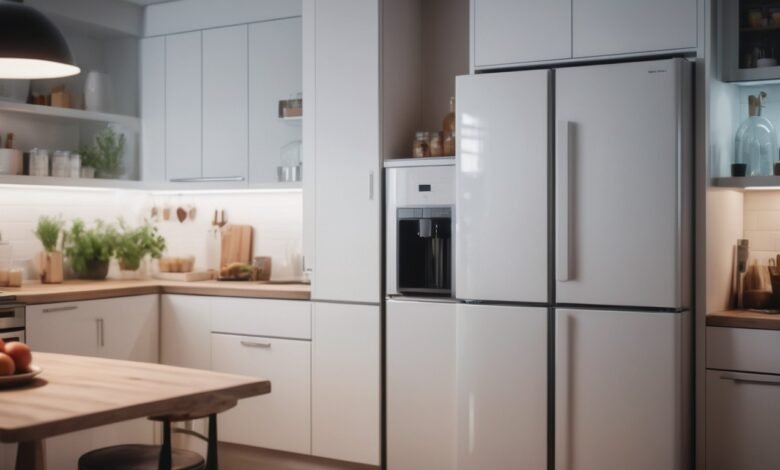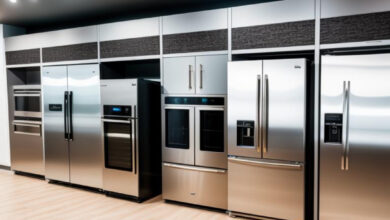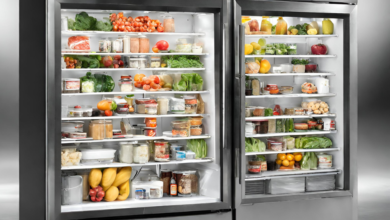Extending the Life of Your Refrigerator: A Comprehensive Guide

Refrigerators are an essential appliance in any modern kitchen, playing a crucial role in preserving the freshness of perishable food items. However, like any other electronic device, refrigerators have a lifespan, and their efficiency can decline over time. In this detailed guide, we will explore various strategies and guidelines to help you extend the life of your fridge, ensuring optimal performance for years to come.
I. Proper Installation
The longevity of your refrigerator begins with its proper installation. Consider the following factors:
1. Location Matters
Place your refrigerator in a well-ventilated area away from direct sunlight and heat-producing appliances. Ensure there is sufficient space around the unit for proper air circulation. Avoid placing it near the stove or dishwasher.
2. Leveling the Fridge
A properly leveled refrigerator ensures that the doors seal tightly, preventing air leaks. Use a level to check and adjust the appliance’s feet accordingly. This not only enhances performance but also prevents unnecessary wear on the compressor.
II. Temperature Management
Maintaining the right temperature settings is crucial for both food safety and the longevity of your refrigerator.
1. Optimal Temperature Settings
Set your refrigerator temperature between 35°F (1.6°C) and 38°F (3.3°C) and the freezer between 0°F (-17.8°C) and 5°F (-15°C). These settings keep food at a safe temperature while minimizing the workload on the compressor.
2. Use a Thermometer
Regularly check the temperatures inside your fridge and freezer using an appliance thermometer. This ensures that the settings remain accurate, preventing food spoilage and reducing energy consumption.
III. Efficient Organization
Properly organizing the contents of your refrigerator not only improves accessibility but also contributes to its longevity.
1. Avoid Overloading
Overloading the fridge can obstruct airflow and strain the compressor. Leave enough space between items for cool air to circulate freely. This prevents the appliance from overworking to maintain the set temperatures.
2. Utilize Door Shelves Wisely
Store frequently used items in the door shelves, as they experience more temperature fluctuations. Reserve the main compartments for items that require a consistently cold environment.
IV. Regular Cleaning and Maintenance
Keeping your refrigerator clean and well-maintained is essential for its longevity and efficiency.
1. Clean Condenser Coils
Dust and debris can accumulate on the condenser coils, hindering heat dissipation. Clean the coils at least twice a year using a vacuum cleaner or a brush. This simple task can significantly improve your fridge’s efficiency.
2. Gasket Maintenance
The door gaskets create a seal to keep cool air in and warm air out. Regularly inspect and clean the gaskets to ensure a tight seal. Replace them if you notice any cracks or tears, as they can lead to energy loss and strain on the compressor.
3. Interior Cleaning
Periodically clean the interior of the refrigerator, removing any spills, crumbs, or expired items. A clean interior promotes better airflow and prevents the growth of bacteria, ensuring a healthier environment for your food.
V. Energy Efficiency
Promoting energy efficiency not only reduces your electricity bill but also extends the life of your refrigerator.
1. Energy Star Appliances
Invest in an Energy Star-rated refrigerator when purchasing a new one. These appliances meet strict energy efficiency guidelines, consuming less power and ultimately reducing wear on components.
2. Set the Right Temperature
As mentioned earlier, maintaining the correct temperature settings avoids unnecessary strain on the compressor, leading to energy savings and increased longevity.
VI. Troubleshooting and Repairs
Addressing issues promptly and performing regular checks can prevent minor problems from escalating.
1. Unusual Noises
Unusual sounds, such as banging or rattling, can indicate a problem. Inspect the condenser fan, evaporator fan, and compressor for any issues. If necessary, consult a professional technician to address the problem promptly.
2. Leak Detection
If you notice water pooling inside the fridge or on the floor, check for leaks in the water supply line, drain pan, or condensate drain. Fixing leaks promptly prevents water damage and potential component corrosion.
VII. Extended Periods of Inactivity
If you plan to be away for an extended period, take appropriate measures to ensure your refrigerator remains in optimal condition upon your return.
1. Empty and Clean
Remove all perishable items from the fridge, and clean the interior thoroughly. This prevents the growth of mold and bacteria in your absence.
2. Power Off or Adjust Settings
Consider turning off the refrigerator or adjusting the temperature settings to conserve energy. If turning it off, leave the doors slightly ajar to prevent odors and mildew.
VIII. Upgrading vs. Repairing
At some point, you may face the decision of whether to repair your aging refrigerator or invest in a new one.
1. Assess the Cost of Repairs
Evaluate the cost of repairing your fridge compared to its current value. If repairs are becoming frequent and costly, it might be more economical to invest in a new, energy-efficient model.
2. Consider Technological Advances
Newer models often come with improved technology, enhanced energy efficiency, and additional features. Assess whether the benefits of upgrading outweigh the costs of repairing an older appliance.
Conclusion
By following these detailed guidelines, you can significantly extend the life of your refrigerator, ensuring it remains a reliable appliance in your kitchen for years to come. Regular maintenance, proper temperature management, and efficient organization are key factors in preserving the freshness of your food and the longevity of your fridge.






